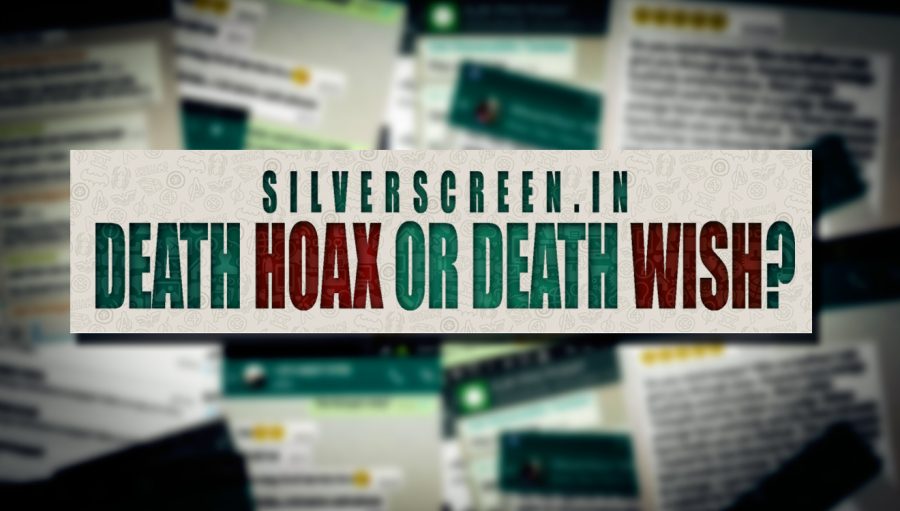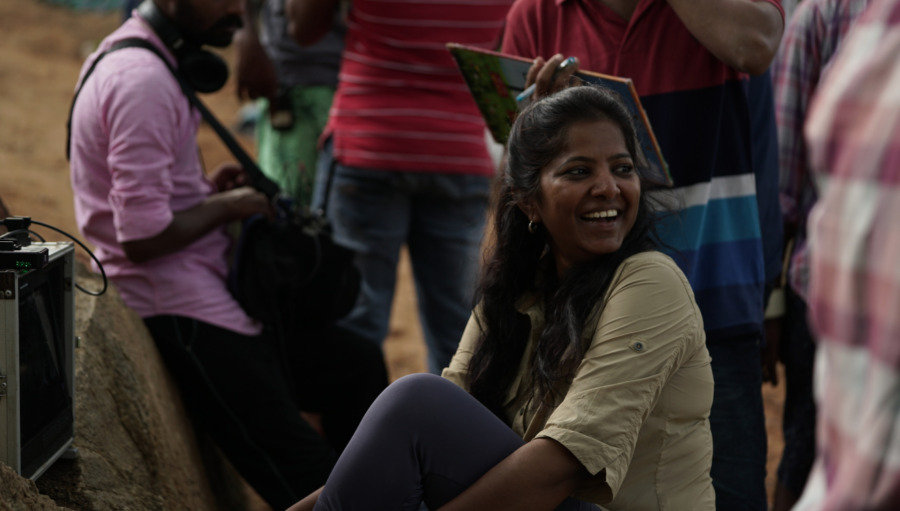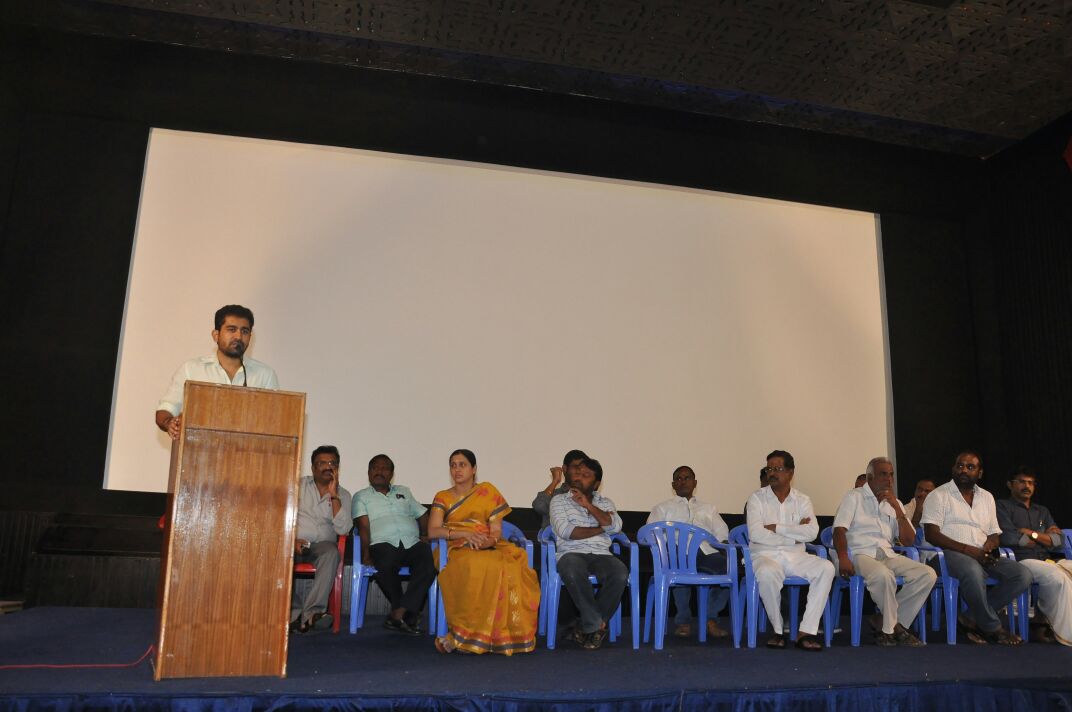Death hoaxes. Or that thing you wish Trump was actually referring to when he talks about fake news. Why start a death hoax? And what do celebrities who aren’t resting in peace just yet have to say about it? Silverscreen takes a look.
Earlier this month, a rumour about Malayalam actress Sanusha’s death was all over social media. The actress herself seemed oblivious to the brouhaha. Even as people shared photos of a destroyed car, supposedly the one in which she lost her life, Sanusha was busy filming.
It took a Facebook post from her brother and upcoming child actor Sanoop to set things right.
Sanusha tells Silverscreen, “When I heard about it, I couldn’t believe that this was happening to me. It took me a while to shake myself out of it and react. This is ugly and the worst thing to happen to a person. It’s like someone wishes you were dead.”
Sanusha is the latest victim to the death hoax, an ugly construct of a world fuelled by the same social media that has spawned revenge porn and morphing.
Sanusha admits that this is the flip side to the fame celebrities enjoy. Just as people on social media can build her up with glowing reviews of her work, they can also pull her down – by sharing morphed photos, alluding to secret relationships, and sharing news about her “death”.
“People I’ve talked to tell me its a part and parcel of life in cinema. It has happened to people like Rajinikanth and Jayalalitha amma. They couldn’t do anything to stop it.”
***
The death hoax is an equal opportunity offender. Trolls target celebrities, but regular people aren’t spared either. Devi (29), an IT professional from Bangalore, received numerous emails from an encrypted account with fake “kanneer anjali” (literally, “tearful tribute”) posters
The influx of complaints about fake death news on social media has substantially increased in the past few years, going by records from cyber crime cells in Chennai, Coimbatore, and Thiruvananthapuram. Vinoth, an officer with the cyber crime centre in Chennai tells Silverscreen, “About three to four years ago, a majority of the complaints we received were about internet fraud and information leaks. Now, it is about fake news, fake photographs. A number of celebrities have registered harassment cases in the form of fake death news with us. A number of civilians have done so too. This is a symptom of the many ways social media continues to rule our lives.”
Psychiatrist Shwetha Menon says that while people turn to cyber harassment because they want attention, the people behind death hoaxes are looking to attack people personally. “In the last few years, people have learnt to tackle online harassment. So for celebrities to take notice, the attacker has to go one step further. Abusing them does not cut it any longer. So, they spread news about their death. It’s personal, its vicious and it achieves their goal. The celebrity reacts.”
However, Thangar Bachan, a recent victim of the hoax, blames journalists and their need for sensationalist news. “Several publications, when they don’t get news, they circulate fake news. The same way, when people don’t get interviews or any insider access, out of revenge, they do things like this.”
An award-winning filmmaker who wished to remain anonymous agrees: “A man I’d met during a media round spread news of my death when I refused to give him an interview. My team figured out that it was him, but because he had a family, we decided to let it go. This sort of thing is upsetting. I have aged parents who were inconsolable when they heard about the hoax. Where I come from, this sort of thing is tantamount to someone wishing I was dead.”
Vinoth says that legal action is the way to go. But it is a long and tedious way to justice. “Often, the amount of time it takes to convict such people becomes a deterrent.”
***
KR Vijaya is still affected by her experience with a death hoax. Rumours of her death continue to spread, apparently fuelled by Vijaya’s decision to move away from the industry. “Following a leg injury, I decided to take things lightly and spend my time at home. Because I stepped away from the spotlight, people automatically assumed that I’d gone.”
Shwetha says, “You suddenly remember so-and-so actor, you remember not seeing them at some huge celebrity function, you remember their age and then you think, oh, she must be dead. This sort of thing is lazy yet vicious. It causes unparallelled damage to the victim.”
***
A Whatsapp media group dedicated to Tamil film journalists frequently gets rumours of a celebrity’s death. At a time when journalism is largely dependent on social media for the latest updates, such rumours are often taken as true and reported immediately. While most print media continues to verify news, online sites often do not. They don’t have the luxury of waiting, and instantly put it out as news.
It is a troubling sign of the degeneration of journalism and journalistic principles.
Vinoth says, “A lot of the complaints regarding rumours of celebrity deaths also have registered complaints against websites and newspapers. The media is held culpable, but ultimately, the punishment takes too long to come. And so, there’s nothing to stop them from actively involving themselves in it.”
Recommended
Thangar Bachan has asked for a stringent system in place to make sure that such things are not repeated. Vinoth, though, feels that in this new-age world of hacking and morphing, there’s nothing that can be done. “As we have all learnt in recent times, nothing is failproof. Not even our government. How can we stop this then?”
“It takes way too long to trace the source of social media rumours. And by that time, the perpetrators have deleted their accounts and gone away. In rare cases, we find out the person who did it, and by that time, the victim just wants to get away from this mess.”
As things stand, it seems there’s no way to figure out the origin of such rumours. An under-equipped government system is unable to track it down. And the lack of proper laws to protect victims means the perpetrators could get away, even if caught.
*****



